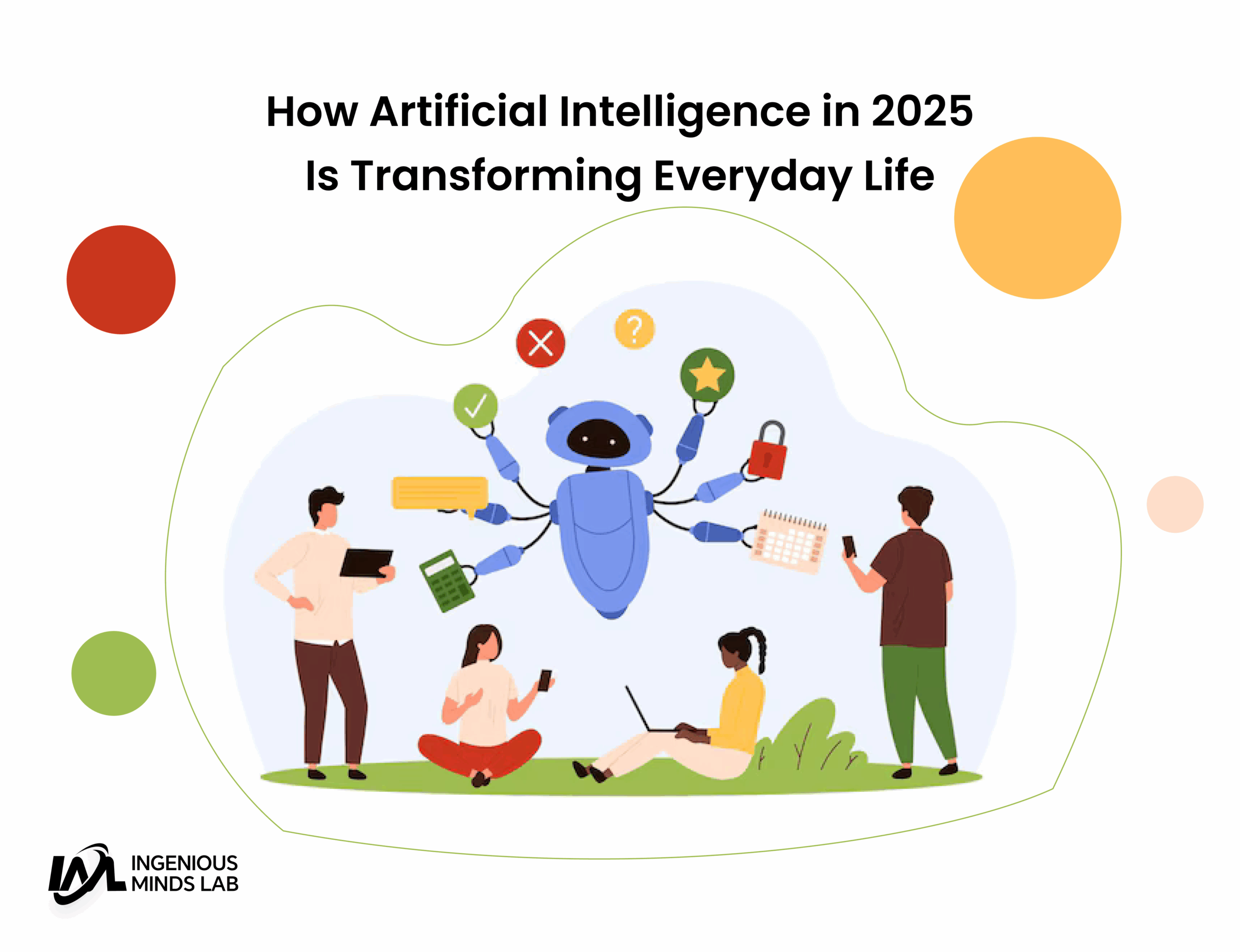In just a few years, Artificial Intelligence in 2025 has evolved from a futuristic idea into a reality deeply integrated into our everyday lives. Whether it’s your smartphone, home assistant, doctor’s clinic, or workplace, AI is playing a critical role in making life smarter, faster, and more efficient.
Today, Artificial Intelligence is not just supporting human tasks—it’s actively improving them. From healthcare to education, and from transportation to creativity, the impact of Artificial Intelligence in 2025 is profound and far-reaching.
Let’s explore how AI is changing life as we know it.
1. Personalized Experiences Powered by AI
One of the most visible aspects of Artificial Intelligence in 2025 is how it personalizes our daily experiences:
Streaming Services like Netflix and Spotify use AI to suggest content tailored to your tastes.
Online Shopping platforms like Amazon recommend products based on your behavior.
Social Media Algorithms on TikTok, Instagram, and YouTube deliver content aligned with your interests.
These AI systems use deep learning models that analyze user data to deliver highly accurate and personal recommendations, increasing engagement and satisfaction.
2. Healthcare Revolutionized by Artificial Intelligence in 2025
Artificial Intelligence in 2025 is reshaping the healthcare industry in dramatic ways:
Early Detection: AI algorithms now detect diseases like cancer and heart conditions at earlier stages than ever before.
Smart Wearables: Devices track your vitals and alert you or your doctor about any abnormalities.
AI-Driven Diagnostics: Doctors use AI-powered tools to read X-rays, MRIs, and CT scans faster and with greater accuracy.
Virtual Health Assistants: Chatbots help patients book appointments, access test results, or get medication reminders.
AI not only improves healthcare delivery but also reduces costs and makes quality care accessible to more people.
3. Education Gets Smarter with Artificial Intelligence
Education has seen a major shift thanks to Artificial Intelligence in 2025:
Customized Learning Paths: AI platforms adapt in real-time based on a student’s strengths and weaknesses.
Instant Feedback: AI tutors help students understand difficult topics by providing immediate explanations.
Automated Grading: Teachers save time with automated essay grading, allowing them to focus more on teaching.
Language Translation: AI removes language barriers, enabling global access to quality education.
With AI, learning is now more inclusive, engaging, and effective.
4. Workplaces Powered by AI
In the professional world, Artificial Intelligence in 2025 is automating repetitive tasks, analyzing data, and supporting decision-making:
AI in Recruitment: From scanning resumes to conducting initial interviews, AI streamlines hiring processes.
Customer Support: Chatbots provide 24/7 assistance, resolving queries in seconds.
Data-Driven Insights: AI tools analyze huge volumes of data to uncover patterns and trends for better business decisions.
Smart Assistants: AI applications like Grammarly, Notion AI, and Microsoft Copilot assist in writing, editing, and summarizing tasks.
Rather than replacing jobs, AI is augmenting human capabilities—boosting productivity and reducing errors.
5. Smart Homes and Everyday AI Assistants
Smart homes are no longer a luxury—thanks to Artificial Intelligence in 2025, they’re becoming the norm:
Voice-Activated Assistants: Devices like Alexa and Google Assistant control your lights, thermostat, and even your coffee machine.
Security Systems: AI-enabled cameras detect suspicious activity and alert homeowners or authorities.
Routine Automation: Smart homes learn your habits—automatically adjusting lighting, temperature, and more.
AI turns homes into responsive environments that make daily life more comfortable and secure.
6. Creativity and Generative AI Tools
Artificial Intelligence in 2025 isn’t limited to logic-based tasks—it has stepped into the creative world too:
Text Creation: AI tools like ChatGPT write blogs, scripts, ads, and emails with ease.
Art & Design: Platforms like MidJourney and DALL·E generate stunning visuals from text prompts.
Music & Audio: AI composes original music, enhances audio quality, and even clones voices.
Video Production: AI helps create, edit, and animate videos using minimal input.
Creative professionals use AI to enhance their output—not replace their skills—leading to faster ideation and production cycles.
7. AI in Transportation and Travel
Artificial Intelligence in 2025 is helping people travel smarter and safer:
Autonomous Vehicles: Self-driving cars are becoming more reliable, using AI to navigate traffic and avoid collisions.
AI Navigation Apps: Google Maps and Waze predict traffic, suggest better routes, and adjust for delays in real time.
Public Transportation: AI optimizes bus/train schedules, predicts vehicle maintenance, and manages urban transit flow.
The result? Reduced congestion, improved safety, and faster commutes.
8. Ethical AI: Challenges and Responsibility
While the benefits are immense, Artificial Intelligence in 2025 comes with critical challenges:
Bias & Fairness: If AI is trained on biased data, it can produce unfair outcomes in hiring, lending, and even law enforcement.
Privacy Concerns: AI needs data—and protecting user data has never been more important.
Misinformation & Deepfakes: Generative AI tools can be misused to create fake videos or audio.
Job Automation: While AI creates new job roles, it also disrupts traditional ones. Upskilling is essential.
To address these issues, governments and tech companies are introducing AI ethics guidelines, regulatory frameworks, and responsible AI policies.
Conclusion: The Future of Artificial Intelligence in 2025
The role of Artificial Intelligence in 2025 is bigger than ever. It’s changing the way we learn, work, travel, create, and even how we care for our health. AI is not just a trend—it’s a fundamental part of modern life.
As we move forward, the challenge is not whether to adopt AI, but how to use it ethically and inclusively. The future isn’t about machines replacing humans—it’s about humans and AI working together to build smarter, more connected lives.
We’re just at the beginning of what AI can do—and the best is yet to come.

